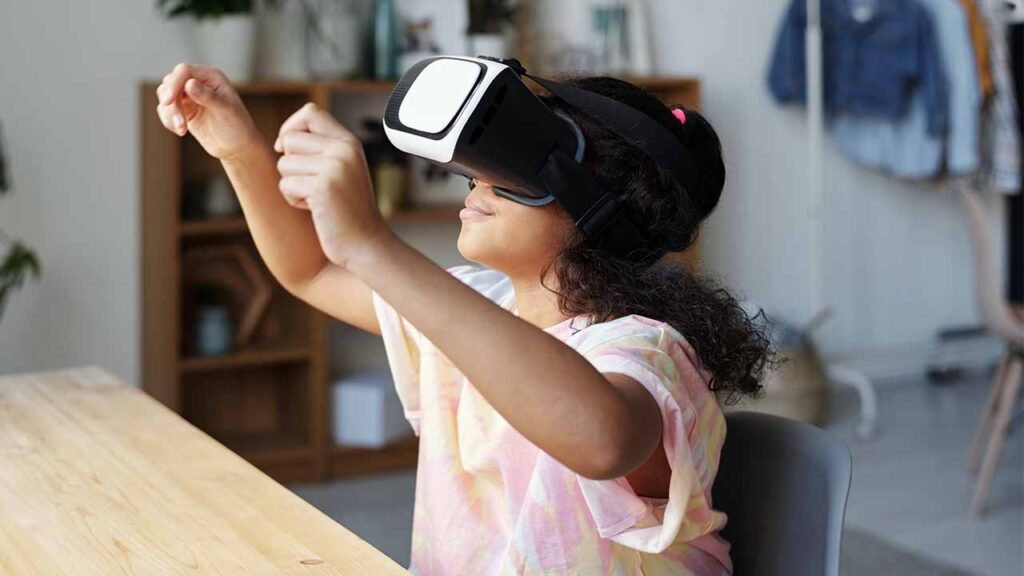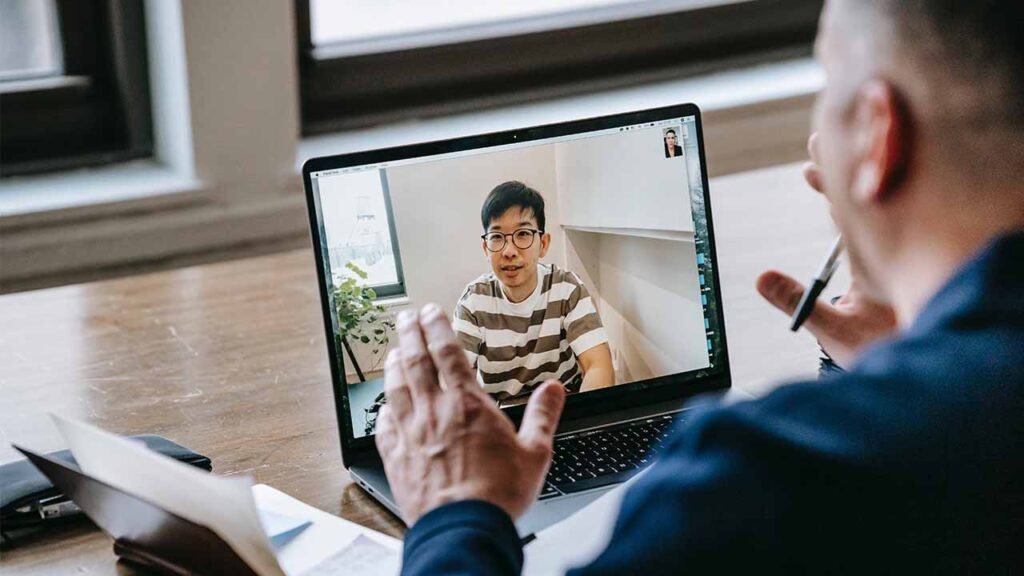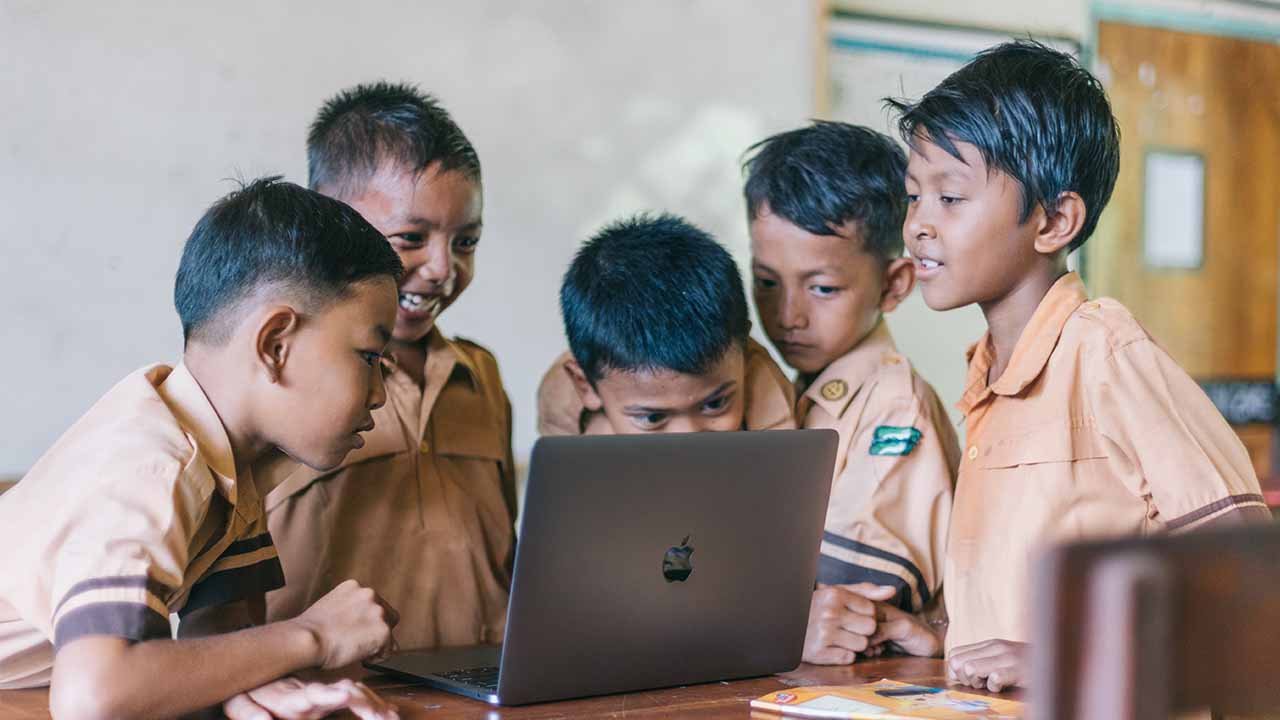Introduction
‘The Future of Education’ In the ever-changing landscape of education, the integration of technology has become synonymous with progress. As we stand on the brink of a new era, it’s imperative to grasp ‘The Future of Education’ and how it intertwines with advanced technological solutions. This introduction delves into the pivotal role that technology plays in shaping the educational sphere, exploring the transformative journey from traditional classrooms to the digital frontier.
Table of Contents
Importance of Technology in ‘The Future of Education’
In the 21st century, education stands at the intersection of innovation and necessity. ‘The Future of Education’ is no longer confined to textbooks and lectures; it’s a dynamic, interactive, and technology-driven experience. Embracing this evolution is paramount, as it equips students with the skills needed to thrive in a digital world. Technology acts as an enabler, enhancing engagement, fostering creativity, and preparing learners for the challenges that lie ahead. In this article, we unravel the significance of integrating technology into education, paving the way for a brighter and more technologically adept generation.
The Evolution of Learning: From Chalkboards to Digital Screens
‘The Future of Education’ is a testament to the remarkable evolution of classroom learning. Gone are the days when the rhythmic sounds of chalk against blackboards filled the halls of educational institutions. Today, classrooms buzz with the hum of digital screens, interactive whiteboards, and immersive online platforms. This evolution represents more than just a change in tools; it signifies a paradigm shift in how knowledge is imparted and absorbed. Digital screens have become windows to a world of endless possibilities, offering students a chance to explore, collaborate, and learn in ways that were once unimaginable.
In the subsequent sections of this article, we will explore how ‘The Future of Education’ is being shaped by technology, from enhancing learning experiences to preparing students for the workforce of tomorrow. Join us on this enlightening journey as we unravel the layers of innovation, creativity, and adaptability that define the modern educational landscape. Together, let’s embrace ‘The Future of Education’ through the lens of technology, empowering learners and educators alike for the challenges and opportunities that lie ahead.
Empowering ‘The Future of Education’ through Interactive Methods
In the pursuit of ‘The Future of Education,’ interactive learning tools have emerged as the cornerstone of modern pedagogy. These tools are not mere gadgets; they represent a paradigm shift in how knowledge is imparted and absorbed. By engaging students in new and exciting ways, these interactive tools are reshaping the educational landscape, fostering creativity, critical thinking, and a thirst for knowledge.
Interactive Learning Tools: Engaging Students in New Ways
Interactive learning tools have revolutionized classrooms, transcending the limitations of traditional teaching methods. In the context of ‘The Future of Education,’ these tools act as catalysts, sparking curiosity and active participation. From touchscreen devices that allow hands-on exploration to collaborative platforms encouraging teamwork, these tools transform passive learners into enthusiastic contributors. By incorporating interactive learning tools, educators not only capture students’ attention but also nurture a deeper understanding of subjects, laying the foundation for a lifelong love of learning.

Gamified Education: Making Learning Fun and Effective
Gamified education represents a cutting-edge approach to learning, where elements of game design are seamlessly integrated into educational experiences. In the realm of ‘The Future of Education,’ gamification goes beyond entertainment; it becomes a powerful tool for making learning both enjoyable and effective. By incorporating game mechanics such as challenges, rewards, and competition, gamified education captivates students’ interest, motivating them to overcome obstacles and achieve academic goals. This approach not only enhances retention but also cultivates essential skills like problem-solving and strategic thinking, preparing students for the challenges of the digital age.
Virtual Simulations: Bringing Complex Concepts to Life

In the quest to understand complex concepts, virtual simulations have emerged as invaluable assets in classrooms. These simulations provide students with immersive, hands-on experiences that bridge the gap between theory and practice. In the context of ‘The Future of Education,’ virtual simulations offer a dynamic way to explore intricate subjects, from scientific phenomena to historical events. By stepping into virtual worlds, students gain a deeper understanding of abstract ideas, enhancing their analytical skills and fostering a sense of curiosity. Virtual simulations not only make learning engaging but also empower students to explore, experiment, and discover, laying the foundation for a future where knowledge knows no bounds.
Join us as we explore the transformative power of interactive learning tools, gamified education, and virtual simulations in the subsequent sections. Together, let’s delve deeper into how these innovative methods are reshaping classrooms, enriching learning experiences, and paving the way for ‘The Future of Education.’
Personalized Learning Paths
In the era of ‘The Future of Education,’ a one-size-fits-all approach no longer suffices. Personalized learning paths have emerged as a transformative force, acknowledging the unique abilities and learning styles of individual students. By embracing adaptive learning platforms and data-driven teaching methods, educators can tailor their approach, ensuring that each learner receives a customized educational experience, setting the stage for a future where education is as unique as the students it serves.
Adaptive Learning Platforms: Tailoring Education to Individual Needs
Adaptive learning platforms represent a fundamental shift in educational methodology. In the context of ‘The Future of Education,’ these platforms leverage technology to create personalized learning journeys for students. By assessing individual strengths and areas for improvement, adaptive platforms dynamically adjust the curriculum, pacing, and content, catering to the specific needs of each learner. This tailored approach not only optimizes understanding but also boosts confidence, empowering students to progress at their own pace. By embracing adaptive learning platforms, educators acknowledge the diverse nature of learning and embrace a future where education is truly inclusive, catering to the unique potential within every student.
Empowering Educators with Student Insights
Data-driven teaching marks a significant stride in the evolution of education. In ‘The Future of Education,’ data is not merely a collection of numbers; it is a powerful tool that empowers educators with valuable insights into student performance and engagement. By analyzing data points, educators gain a comprehensive understanding of students’ strengths, challenges, and learning patterns. This insight enables targeted interventions, allowing educators to provide timely support and encouragement. Data-driven teaching fosters a collaborative relationship between educators and students, ensuring that the learning experience is not only personalized but also responsive to individual needs. By harnessing the potential of data, educators lay the foundation for a future where education is finely tuned to the unique requirements of each learner, fostering a generation of confident, capable, and empowered individuals.

Join us as we delve deeper into the realm of personalized learning paths, exploring the intricacies of adaptive learning platforms and the transformative impact of data-driven teaching. Together, let’s unravel the potential of these tailored approaches, shaping a future where education is as diverse and unique as the learners it nurtures.
Collaboration Beyond Classroom Walls: Global Connections
In the digital age, the boundaries of education extend far beyond the physical confines of a classroom. Collaborative learning experiences, facilitated by virtual classrooms, online forums, and cultural exchanges, are redefining ‘The Future of Education.’ By fostering connections among students from diverse backgrounds and cultures, these platforms are breaking down barriers, encouraging collaboration, and enriching the educational journey. Join us as we explore the transformative power of collaboration beyond classroom walls, embracing a future where global perspectives and shared knowledge shape the learners of tomorrow.
Virtual Classrooms: Connecting Students Globally
Virtual classrooms serve as portals to a world without borders, where students can engage in real-time learning experiences with peers from across the globe. In the context of ‘The Future of Education,’ these virtual spaces nurture a sense of community and collaboration, enabling students to interact, learn, and collaborate despite geographical distances. By connecting students globally, virtual classrooms open doors to diverse perspectives, cultural exchanges, and collaborative projects. This global connectivity not only broadens students’ horizons but also instills empathy, tolerance, and understanding, preparing them to thrive in an interconnected world. Embracing virtual classrooms is not just about expanding educational access; it’s about creating a global network of learners who share knowledge, ideas, and aspirations, shaping a future where collaboration knows no boundaries.
Online Forums and Cultural Exchanges: Expanding Perspectives
Online forums and cultural exchanges are bridges that span continents, connecting students in meaningful dialogues and collaborations. In the realm of ‘The Future of Education,’ these platforms serve as vibrant hubs of discussion, idea exchange, and mutual learning. By participating in online forums, students engage in intellectual debates, share insights, and collaborate on projects that transcend cultural differences. Cultural exchanges, whether virtual or in-person, provide firsthand experiences of diverse traditions, languages, and perspectives, fostering a deep appreciation for global diversity. These interactions cultivate a spirit of curiosity, respect, and acceptance, equipping students with the intercultural competence needed to thrive in an increasingly globalized world. Embracing online forums and cultural exchanges is not just about expanding knowledge; it’s about cultivating a sense of global citizenship, enriching the educational journey, and preparing students to become compassionate, open-minded, and globally aware leaders of tomorrow.
Join us as we navigate the boundless world of collaborative learning, exploring the impact of virtual classrooms, online forums, and cultural exchanges on ‘The Future of Education.’ Together, let’s embrace the opportunities these platforms offer, fostering a future where education transcends borders, uniting learners in a shared quest for knowledge and understanding.
Preparing Students for the Workforce
In the ever-evolving landscape of the modern job market, preparing students for success requires a strategic focus on digital literacy and the intersection of education with future employment. ‘The Future of Education’ is not just about academic achievements; it’s about equipping students with practical skills, digital fluency, and a forward-thinking mindset that aligns seamlessly with the demands of the professional world. Join us as we explore the essential components of preparing students for the workforce, ensuring they enter the job market confident, capable, and ready to make meaningful contributions.
Digital Literacy: A Key Requirement in the Modern Job Market

Digital literacy stands as a fundamental pillar in ‘The Future of Education’ and the contemporary job market. In an era where technology permeates every industry, possessing digital literacy skills is no longer optional but essential. From basic computer proficiency to advanced knowledge of digital tools and platforms, digital literacy empowers individuals to navigate the digital landscape with confidence. In this section, we delve into the significance of digital literacy, exploring how these skills enhance employability, open doors to diverse career opportunities, and enable individuals to thrive in a technology-driven workforce. By mastering digital literacy, students not only enhance their marketability but also lay a robust foundation for lifelong learning and professional growth.
Technology and Career Paths: How Education Influences Future Employment
Education plays a pivotal role in shaping the career paths of individuals, influencing the opportunities available to them in the job market. In ‘The Future of Education,’ understanding the symbiotic relationship between education and employment is crucial. By aligning educational pursuits with emerging technologies and industry demands, students can make informed decisions about their career trajectories. This section explores how education serves as a catalyst, preparing students for specialized fields, from artificial intelligence and data science to sustainable technology and digital marketing. By embracing technology-infused educational paths, students gain a competitive edge, positioning themselves as valuable assets in an ever-changing job market. Through strategic educational choices, individuals can embark on fulfilling careers that not only align with their passions but also contribute meaningfully to society, shaping a future where innovation and expertise drive progress.
Lifelong Learning : Sustaining ‘The Future of Education’ through Continuous Growth
In the ever-evolving landscape of ‘The Future of Education,’ the pursuit of lifelong learning and the cultivation of essential skills are paramount. Problem-solving, critical thinking, and adaptability are not just buzzwords but essential attributes that empower individuals to thrive in a rapidly changing world. Additionally, embracing the concept of lifelong learning is key to staying relevant and resilient in an environment where knowledge becomes obsolete at an unprecedented pace. This section delves into the core aspects of lifelong learning and skill development, illuminating the path to continuous growth and personal evolution.
Essential Skills for the Future
Problem-solving, critical thinking, and adaptability stand as the cornerstones of success in ‘The Future of Education’ and beyond. These essential skills equip individuals with the ability to analyze complex situations, devise innovative solutions, and swiftly adapt to new challenges. In an era defined by technological advancements and unforeseen disruptions, honing these skills is not a choice but a necessity. This section explores how problem-solving abilities enable individuals to dissect multifaceted problems, critical thinking sharpens their analytical acumen, and adaptability equips them to navigate diverse and dynamic environments. By cultivating these skills, individuals not only enhance their problem-solving prowess but also develop the resilience needed to face the uncertainties of the future. In ‘The Future of Education,’ these skills are not just attributes; they are empowering tools that transform challenges into opportunities, enabling individuals to thrive in any scenario.
Embracing Lifelong Learning: Staying Relevant in a Fast-Changing World
In a world where knowledge becomes outdated rapidly, embracing the concept of lifelong learning is imperative. Lifelong learning transcends traditional educational boundaries, emphasizing the continuous acquisition of knowledge, skills, and perspectives throughout one’s life. By adopting a proactive approach to learning, individuals can stay ahead of the curve, remaining relevant in their fields and exploring new horizons. This section delves into the significance of lifelong learning, exploring how it fosters intellectual curiosity, adaptability, and a growth mindset. Lifelong learners are not confined by their past experiences; instead, they embrace new challenges, acquire new skills, and explore uncharted territories. In ‘The Future of Education,’ lifelong learning emerges as a transformative force that propels individuals into a future where curiosity fuels exploration, knowledge fuels innovation, and learning becomes a lifelong adventure.
Join us as we navigate the transformative journey of lifelong learning and skill development, exploring the intrinsic value of problem-solving, critical thinking, and adaptability. Together, let’s embrace the endless possibilities that continuous growth offers, nurturing a future where individuals are not just equipped with knowledge but also empowered with the skills and mindset to navigate an ever-changing world with confidence and resilience.
Conclusion: Shaping ‘The Future of Education’
As we draw the curtains on this exploration of ‘The Future of Education,’ it becomes evident that we stand at the threshold of a transformative era, where education and technology converge to create boundless opportunities. Throughout this journey, we have delved into the pivotal role of technology in education, the significance of personalized learning, the power of collaboration beyond borders, and the essential skills that prepare individuals for the workforce and lifelong success. In this conclusion, we reflect on the profound impact of education in the digital age and the responsibility of educational institutions in shaping tech-savvy innovators ready to navigate the challenges and embrace the possibilities of the future.
Shaping the Future: Empowering Students to Thrive in the Digital Era
Education, now more than ever, serves as the cornerstone of progress, equipping students with the knowledge, skills, and mindset to thrive in the digital era. ‘The Future of Education’ is not a distant vision but a reality unfolding before us. By embracing technology, interactive learning, personalized approaches, and global collaborations, we empower students to become agile thinkers, creative problem solvers, and adept communicators. Education becomes a catalyst, inspiring curiosity, fostering resilience, and nurturing a passion for lifelong learning. In this digital era, students are not just recipients of information; they are active participants, explorers, and creators, shaping the future through their ingenuity and determination.
The Role of Educational Institutions in Fostering Tech-Savvy Innovators
Educational institutions hold a sacred responsibility in sculpting the leaders and innovators of tomorrow. In ‘The Future of Education,’ institutions are not mere providers of knowledge; they are catalysts of change, fostering environments where creativity flourishes, curiosity is nurtured, and technology is seamlessly integrated into the learning experience. By embracing innovative teaching methods, fostering a spirit of inquiry, and instilling a culture of collaboration, educational institutions pave the way for the emergence of tech-savvy innovators. These institutions become hubs of inspiration, guiding students towards a future where they are not just prepared for the challenges of the digital era but are also equipped to drive innovation, lead with integrity, and make a meaningful impact on the world.
In closing, ‘The Future of Education’ is not a destination but a continuous journey of exploration, adaptation, and transformation. It is a journey where educators, students, and institutions embark hand in hand, navigating uncharted territories, embracing new technologies, and shaping a future where knowledge knows no bounds. As we step into this future, let us carry the torch of innovation, curiosity, and lifelong learning, illuminating the path for generations to come. Together, we are architects of a future where education is not just a means to an end but a lifelong adventure, empowering individuals to thrive, innovate, and contribute to a world shaped by knowledge, compassion, and limitless possibilities.
Additional Resources:
In the vast landscape of ‘The Future of Education,’ the quest for knowledge is endless, and the opportunities for learning are boundless. As we conclude this insightful journey, we recognize the importance of continuous exploration and growth. To further enrich your understanding and embrace the endless possibilities of education in the digital age, we present a curated selection of recommended reading and online courses. These resources serve as gateways to deeper insights, innovative ideas, and specialized knowledge, empowering you to expand your horizons and embark on a lifelong learning adventure.
Recommended Reading:
- “The Fourth Industrial Revolution” by Klaus Schwab – Explore the transformative impact of technology on society and industries, offering insights into the future of work and education.
- “Creative Confidence” by Tom Kelley and David Kelley – Unlock your creative potential and foster innovation in the digital era, essential skills for ‘The Future of Education.’
- “The Innovator’s Dilemma” by Clayton M. Christensen – Delve into disruptive innovation and its implications on education, providing valuable perspectives on adapting to change.
- “Teaching in the Digital Age” by Brian Puerling – A practical guide for educators, emphasizing the integration of technology in early childhood education, fostering a strong foundation for future learning.
- “Life 3.0: Being Human in the Age of Artificial Intelligence” by Max Tegmark – Explore the ethical and existential questions surrounding artificial intelligence, offering insights into the intersection of humanity and technology.
Online Courses for Further Exploration:
- Coursera (coursera.org) – Discover a wide array of courses from leading universities and institutions, covering topics such as artificial intelligence, data science, digital marketing, and more.
- edX (edx.org) – Enroll in courses from top universities and organizations, exploring subjects like computer science, business innovation, and global issues, preparing you for ‘The Future of Education.’
- Udemy (udemy.com) – Explore practical, skill-based courses ranging from coding and graphic design to entrepreneurship and communication, enhancing your expertise in diverse fields.
- Khan Academy (khanacademy.org) – Access free educational content on a variety of subjects, including mathematics, science, programming, and humanities, catering to learners of all ages.
- LinkedIn Learning (linkedin.com/learning) – Dive into professional development courses, sharpening your skills in leadership, technology, creativity, and other essential areas for the evolving job market.
These recommended readings and online courses serve as portals to a wealth of knowledge, enabling you to delve deeper into specific areas of interest, acquire new skills, and stay abreast of the latest trends in education, technology, and beyond. Embrace these resources, and let your journey toward a future of endless possibilities in education continue. Happy learning!




